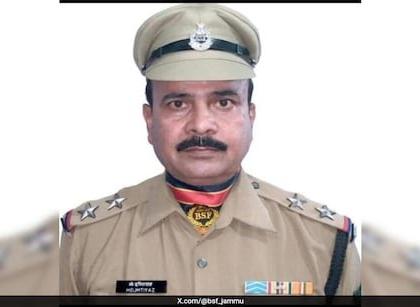Pakistan Violates Ceasefire: BSF Trooper Killed, 7 Injured in Jammu Shelling
By Lokmat English Desk | Updated: May 11, 2025 08:30 IST2025-05-11T08:28:14+5:302025-05-11T08:30:49+5:30
Hopes for de-escalation between India and Pakistan were dashed on Saturday as Pakistan violated a ceasefire agreement just three ...

Pakistan Violates Ceasefire: BSF Trooper Killed, 7 Injured in Jammu Shelling
Hopes for de-escalation between India and Pakistan were dashed on Saturday as Pakistan violated a ceasefire agreement just three hours after it was announced. The truce, reportedly brokered through back-channel negotiations and publicly acknowledged by both nations, was shattered by heavy shelling and indiscriminate firing across the International Border (IB) and Line of Control (LoC), resulting in the death of BSF trooper and injuring seven others.
The incident took place in the R S Pura sector. A senior Border Security Force (BSF) officer said sub-inspector Mohammed Imteyaz made the supreme sacrifice while gallantly leading from the front. He, along with seven others, were injured in cross-border firing initiated by Pakistan. While Imteyaz succumbed to his injuries, the other personnel were admitted to a hospital, the officer said. "We salute the supreme sacrifice made by BSF braveheart sub-inspector Md Imteyaz in service of the nation on May 10, 2025, during cross-border firing along the International Boundary in R S Pura area, district Jammu," the force's Jammu frontier said in a post on X. It added that the BSF director general and all ranks offered their deepest condolences to his family. A wreath-laying ceremony will be held at the BSF's Jammu frontier headquarters in Paloura on Sunday to honour Imteyaz, the officer said. The BSF is tasked with guarding a more than 2,000-kilometre-long frontline between India and Pakistan.
The ceasefire, which India agreed to after careful consideration and was slated to take effect at 5 PM on Saturday, was announced following mediation efforts by the United States. US President Donald Trump stated that the agreement was reached through ongoing diplomatic discussions facilitated by his administration. However, by nightfall, the border regions once again plunged into a state of heightened conflict. The ceasefire violations led to widespread blackouts in several districts across Jammu & Kashmir, Rajasthan, and Punjab, including Srinagar, Udhampur, Akhnoor, Nowshera, Poonch, Rajouri, Mendhar, Jammu, Sunderbani, R.S. Pura, Aniya, Kathua, Reasi, Katra (J&K), Firozpur (Punjab), and Barmer (Rajasthan).
The initial agreement for a ceasefire came after Pakistan's Director General of Military Operations (DGMO) contacted his Indian counterpart at 3:35 PM on Saturday, leading to a mutual decision to halt cross-border shelling, missile launches, drone attacks, and other aerial strikes from 5 PM. US Secretary of State Marco Rubio confirmed his engagement with India's External Affairs Minister S. Jaishankar, Pakistan's Foreign Minister Ishaq Dar, and Pakistan’s Army Chief General Asim Munir. He noted that within the preceding 48 hours, US Vice President J.D. Vance had also held discussions with Prime Minister Narendra Modi, National Security Advisor Ajit Doval, and Pakistani leaders, culminating in the short-lived ceasefire agreement.
Despite the agreed-upon cessation of hostilities, Pakistan resumed indiscriminate shelling using mortars and medium artillery in the Nowshera, Akhnoor, and Sunderbani sectors. Adding to the grim situation, a drone explosion in Baramulla, Kashmir, resulted in the martyrdom of BSF officer Sub-Inspector Mohammad Imtiyaz, with seven other personnel sustaining injuries. Disturbing video footage purportedly showing drone attacks in the Kathua-Sanjhi belt also circulated widely.
Former Jammu & Kashmir Chief Minister Omar Abdullah strongly condemned the ceasefire violations, sharing related videos on social media and questioning the credibility of the announced truce. India's Foreign Secretary Vikram Misri, speaking late Saturday, asserted that Pakistan's continued violations were met with an appropriate response from the Indian Army. He conveyed that the military had been given clear instructions to deliver a firm and fitting reply to any further hostile actions.
Meanwhile, India has maintained the closure of its 32 airports, initially imposed until May 14, and has made no decisions regarding the resumption of visa issuance for Pakistani nationals. The Indus Waters Treaty also remains suspended. The DGMOs of both nations are scheduled to hold another conversation on May 12 at 12 PM to discuss the path forward amidst the escalating tensions. Amidst the volatile situation, India’s National Security Advisor Ajit Doval conveyed to Chinese Foreign Minister Wang Yi that war was not India's intention and served no one's interest. However, he emphasized that the Pahalgam terror attack which resulted in significant Indian casualties, necessitated a strong response, which manifested in Operation Sindoor.
In a national address, Pakistan's Prime Minister Shehbaz Sharif presented a contrasting narrative, bizarrely claiming that India had "imposed war" and asserting Pakistan's "victory." He accused India of directly attacking Pakistani military bases and destroying key armament stockpiles, labeling it an act of war. Sharif lauded Army Chief General Asim Munir for his "decisive leadership" and expressed gratitude to Donald Trump and various nations, including Saudi Arabia, UAE, Turkey, Qatar, the UK, the UN, and particularly China, whom he hailed as Pakistan’s “true friend” for 78 years of unwavering support.
Open in app